Buying seeds used to be a simple process, but not anymore. Walking into an agriculture store or garden center and grabbing a packet of lettuce seeds used to be something you could do without worry. Now, the three vastly different type of readily available seeds require keen reading off all the fine print on the label.
Homesteaders, preppers, and gardeners in general can hold some very strong opinions about which types of seeds are best, and why. Folks tend to cling to their seed buying habits like sports fans to their favorite teams, but for far more important reasons. The type of seeds you choose to grow can have an enormous impact on the chances of cultivating a successful yield, being able to collect seeds to grow the following year, and even potentially on the health of both your family and the environment.
Heirloom Seeds
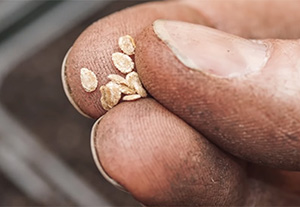 These type of seeds have literally been around for centuries. Last year I grew tomatoes from seeds that were the “offspring” from tomatoes Thomas Jefferson planted in his garden at Monticello. Heirloom seeds are often saved after each harvest and handed down through generations. They are also open pollinated and arguably produce the best tasting fruits and vegetables.
These type of seeds have literally been around for centuries. Last year I grew tomatoes from seeds that were the “offspring” from tomatoes Thomas Jefferson planted in his garden at Monticello. Heirloom seeds are often saved after each harvest and handed down through generations. They are also open pollinated and arguably produce the best tasting fruits and vegetables.
New varieties of heirloom seeds are created by cross pollinating two related yet different plants for a minimum of six but usually 10, generations. This creation process is decidedly slower that the one used to create hybrid seeds, but produces true replicas of the parent plants. The micro-climate of the garden where the seeds were painstrainkly produced over multiple seasons, would have imprinted on the seeds, making them more acclimated to the weather, soil, and insects patterns.
What Is Open Pollination?
Open pollinated seeds are those that can be produced by cross pollination two of the exact same type of plant without human intervention. Heirloom seeds are the only seeds that can open pollinate and generate a working replica of the parent plants.
The plants that are produced via open pollination are only slightly and naturally varied due to the soil and other environmental conditions which surround them. Seeds carried by birds, wind, rain, or insects are often responsible for relocating the seeds and churning out “volunteer” plants in a different spot in your garden or yard.
Farmers have acquired and saved seeds via natural open pollination for centuries. Poor farmers around the world both of long ago and today, relied on the intentional or accidental collection and pollination of seeds in this manner to garner seeds to replant for the coming year.
All heirloom seeds are open pollinated, and they can be saved and passed from generation to generation.![]()
Hybrid Seeds
Hybrid seeds were created during the 1960s as part of what has been dubbed the “Green Revolution.” The goal of the movement was to enhance grain yields on a global scale by creating hybrid seeds that could thrive when planted densely, live in an environment where chemical pesticides and fertilizers were applied heavily, and were sustained by mechanical irrigation. The folks involved in the movement believed hybrid seeds could produce a greater yield than heirloom seeds.
The United States government ensured poor countries like Mexico and India that the recently developed “miracle seeds” would help elevate peasant farmers out of poverty. Free bags of both hybrid seeds and chemical fertilizer were given to farmers to coerce them to try planting the hybrid seeds.
The poor farmers did see better yields, but it also took a lot more water and fertilizer to grow their crops. When the seeds they saved from the annual harvest were saved for planting the following year did not grow or grow well, the farmers were forced to buy new seeds – which was not in their incredibly small budgets.
Hybrid seeds can be produced organically and are not necessarily genetically modified. One example of using the hybrid seed process to develop an entirely new type of produce is the honeycrisp apple. This apple was created at the University of Minnesota when two other types of apples were combined in an effort to create a juicier and more crispy, new type of apple.
The advantage to using hybrid seeds is the ability to cross pollinate in a natural manner to garner the best traits of two plants of the same species. Hybrid plants may require both more fertilizer and water to thrive, than heirloom or GMO plants.
The most basic and oldest type of seed hybridization involves corn detasseling. During this process one row of the mother parent plant is grown and three rows of the father parent plant are grown in each section of a growing plot.
The mother parent plant rows have their pollen removed – or are detasseled. This ensures that the plants are only receiving pollen from the father parent plants. Next, the seeds from the mother plants are harvested and dubbe F1 generation hybrids.
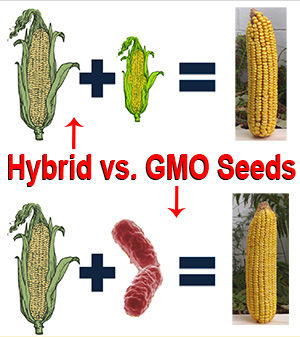
The vast majority of hybrid seeds are created using this same free or nearly free and low-tech process. Typically, hybrid seed creation is conducted inside of greenhouses or in fields that have been both isolated and boast covered rows. But, some hybrid seeds are created inside of biotech labs via DNA manipulation.
If you sow the seeds of a hybrid plant that are not sterile you will develop a next generation or F2 plant. This plant will not necessarily have the same preferred traits of the parents plants but a random mix of traits that will create a widely different plant.
Related: The 5 Seeds That You Need to Stockpile in Your Pantry
 Genetically Modified (GMO) Seeds
Genetically Modified (GMO) Seeds
This controversial seeds were created by the biotech industry in an effort they have claimed will make the crops more resistant to drought, disease, and weeds. Genetically modified seeds hit store shelves in 1996 – and now GMO seeds dominate that space around the world.
Biotech scientists take a good trait from one living thing and infuse it into the traits of a plant. This process alters the natural makeup of the plant so it exhibits traits that are alien to it.
For instance, GMO rice created “Golden Rice” by adding two genes into a rice plant so it was able to accumulate beta carotene in its grains. They felt this would increase vitamin A intake and help prevent childhood blindness. In the case of GMO corn, a bacterial toxin has been infused into each little kernel in an effort to make it more hardy against rootworm.
[supsystic-tables id=4]
Seed Variety
You can find every type of fruit and vegetable on the planet in heirloom seed varieties. Hybrid seed are available in nearly the same level of diversity and quantity.
To date, only a select number of GMO seeds have been approved for commercial sale in the United States. But, because corn and soybeans are used as the base for many groceries we purchase at the supermarket, the reach of genetically modified seeds is enormous.
Types Of GMO Seeds In America
Below are some of the most popular and prevalent GMO seed varieties available at both far and garden stores and online.
[supsystic-tables id=5]
Seed Prices
The cost of seeds varies widely not just based on heirloom, GMO, or hybrid type, but by manufacturer and rarity of the breed. Typically, heirloom seeds cost more than the mega mass produced GMO seeds and most hybrid seeds. But, due to the fact hybrid seeds generally require both more water, pesticides, and fertilizer to grow, making the growing to harvest cost substantially more.
Can You Avoid GMOs?
It is becoming almost impossible to avoid the consumption of genetically modified food – unless you grow and raise the bulk of what you consume. Approximately 85 percent of the food now stocked on grocery store shelves contains genetically modified ingredients.
Do not expect either seeds or foods to be labeled to note they contain genetically modified ingredients. Biotech companies and industrial farms have long lobbied against forced labeling of their products. Heirloom seed suppliers always proudly display a label noting the origins of their products, just like organic food suppliers typically do, as well.
If you do not mind growing GMO seeds, there is little need to squinch your eyes to read all of the fine print on the label or the inside cover of a seed catalog. But, if keeping your garden natural and/or being able to harvest quality seeds season after season are part of your self-reliance goals, due diligence must be taken when browsing seed packets and advertisements.
You may also like:
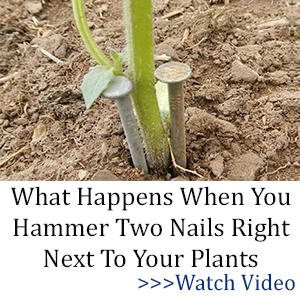 The Only 6 Seeds You Need to Stockpile for a Crisis
The Only 6 Seeds You Need to Stockpile for a Crisis
This Bug Will Kill Most Americans During The Next Crisis (Video)
24 Prepping Items I Don’t Spend Money On
How to Adjust the pH in Soil and Water for Abundant Harvests
Mosquito-Repelling Weeds That You Can Plant This Spring In Your Backyard

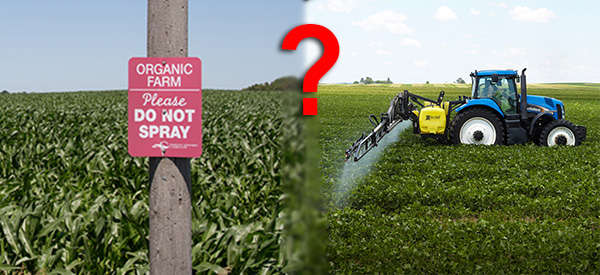










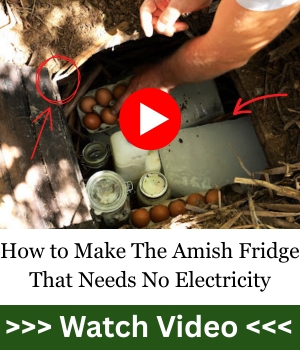








I plant heirloom seeds only.
I let a few of the best plants go to seed so I’ll have them for next year so far everything has gone well.
If I do need more seeds I buy them from My Patriot Supply
I decided to shop for seeds online for the 1st time this year. Reading customer reviews of the various products I was surprised at how many people received seeds that didn’t germinate, or germinated at an unacceptably low rate. The heirloom beans and corn I settled on in fact came up at less than 50%. Is this typical of heirloom seeds? Learning in the garden is a process that takes several seasons, would like to hear what other gardeners are actually planting.
Not normally. This year, yes, it’s a bad year, but I also have problems with birds in the seed beds. And, as well, we’ve gotten a lot of devil winds, hot, dry, with high temps early on. Before that, abnormally cold (whatever normal is 🙂 But, most folks only have covers in the soil till the monsoons, then put out plants and seeds. I garden year-’round. niio
Yea heirloom good GMO/hybrid bad.
Where can you order heirloom seeds? I have been hunting a green bean that is called an Heirloom or case knife been, but I can’t find any locally.
Patriot has a great deal on seeds that are Heirloom…
My Patriot Supply and Victory Seeds have what you are looking for.
There are a few heirloom green beans out there. Contender, Blue Lake, Kentucky Wonder are a few. I’ve never heard of a case knife bean, but maybe someone will post that has.
I get mine from local stores like Tractor Supply, or online from heirloom growing (mozybeau farms) on eBay. There’s a Veteran that sells from their site. All good stuff and wonderful company.
Try Baker Creek @bakercreek.com. They have a good selection of heirloom and non-gmo seeds and pricing seems good as well.
I googled case knife beans and there were a bunch of outlets selling them, but I’m not familiar with the different companies – most seemed in the South, so I assume that it’s a common bean down there. Don’t know if they grow well in other parts of the country.
Miss Kitty, check with your local agriculture extension office and see if those case knife beans will grow in your zone.
I’d say unless you were way up north with freezing conditions you should be ok to grow them.
Hybrid/GMO plants require more fertilizer/water because they yield more. They may require less pesticides depending on which GMO trait they have.